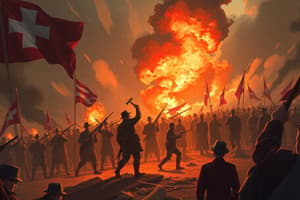Podcast
Questions and Answers
Which of the following was a major factor contributing to the outbreak of World War I?
Which of the following was a major factor contributing to the outbreak of World War I?
- Competition for colonies and resources among European powers (correct)
- Environmental disasters in the early 20th century
- Economic recession in Europe
- Labor strikes across Europe
What was a key characteristic of nationalism in the early 20th century?
What was a key characteristic of nationalism in the early 20th century?
- Desire for global unity and cooperation
- Promotion of pacifism
- Strong feelings of national identity and pride (correct)
- Advocacy for colonial expansion
What was a consequence of the buildup of military forces in Europe in the early 20th century?
What was a consequence of the buildup of military forces in Europe in the early 20th century?
- Increased tensions and risk of war (correct)
- Increased diplomatic cooperation
- Establishment of international peacekeeping forces
- Reduced risk of war
What event is often cited as the immediate cause of World War I?
What event is often cited as the immediate cause of World War I?
What was a key feature of the alliances system in Europe prior to World War I?
What was a key feature of the alliances system in Europe prior to World War I?
What was a primary motivation behind European powers' competition for colonies and resources?
What was a primary motivation behind European powers' competition for colonies and resources?
Which of the following is a characteristic of nationalism in the early 20th century?
Which of the following is a characteristic of nationalism in the early 20th century?
What was a result of the buildup of military forces in Europe in the early 20th century?
What was a result of the buildup of military forces in Europe in the early 20th century?
Where was Archduke Francis Ferdinand assassinated?
Where was Archduke Francis Ferdinand assassinated?
What was a consequence of the complex system of alliances between European powers?
What was a consequence of the complex system of alliances between European powers?
Flashcards are hidden until you start studying
Study Notes
Causes of World War I
Imperialism
- Competition for colonies and resources among European powers
- Many European countries had colonies and territories around the world
- Imperialism led to rivalries and tensions between countries
- Examples:
- Scramble for Africa (1880s-1900s)
- European powers competing for influence in Asia and the Pacific
Nationalism
- Strong feelings of national identity and pride
- Desire for independence and self-governance among ethnic groups
- Examples:
- Balkan states seeking independence from Austria-Hungary
- Irish seeking independence from Britain
Militarism
- Building and maintaining large military forces
- Glorification of war and the military
- Examples:
- Germany's military expansion under Kaiser Wilhelm II
- France's military buildup in response to Germany
Assassination of Archduke Franz Ferdinand
- June 28, 1914: Archduke Franz Ferdinand, heir to Austria-Hungary's throne, was assassinated in Sarajevo, Bosnia
- Assassination carried out by Gavrilo Princip, a member of the Black Hand, a Serbian nationalist group
- Event sparked a chain reaction of diplomatic crises and military mobilizations
Alliances System
- Complex system of alliances and agreements between European powers
- Created a situation in which a small conflict between two countries could escalate into a larger war
- Examples:
- Triple Entente: France, Britain, and Russia
- Triple Alliance: Germany, Austria-Hungary, and Italy
- Balkan states aligned with various European powers
Causes of World War I
Imperialism
- European powers competed for colonies and resources, leading to rivalries and tensions
- Many countries had colonies and territories around the world, fueling the competition
- Examples of imperialism include the Scramble for Africa (1880s-1900s) and European powers competing for influence in Asia and the Pacific
Nationalism
- Strong feelings of national identity and pride led to desires for independence and self-governance among ethnic groups
- Examples include Balkan states seeking independence from Austria-Hungary and Irish seeking independence from Britain
Militarism
- Building and maintaining large military forces was a key aspect of national power and prestige
- Glorification of war and the military contributed to an atmosphere of aggression
- Examples include Germany's military expansion under Kaiser Wilhelm II and France's military buildup in response to Germany
Assassination of Archduke Franz Ferdinand
- June 28, 1914: Archduke Franz Ferdinand, heir to Austria-Hungary's throne, was assassinated in Sarajevo, Bosnia
- The assassination was carried out by Gavrilo Princip, a member of the Black Hand, a Serbian nationalist group
- This event sparked a chain reaction of diplomatic crises and military mobilizations
Alliances System
- A complex system of alliances and agreements between European powers created a situation in which a small conflict between two countries could escalate into a larger war
- Examples of alliances include the Triple Entente (France, Britain, and Russia) and the Triple Alliance (Germany, Austria-Hungary, and Italy)
- Balkan states aligned with various European powers, further complicating the situation
Causes of World War I
Imperialism
- European powers, particularly Britain, France, Germany, and Belgium, competed for colonies and resources in Africa and Asia, leading to tensions and rivalries.
- The Scramble for Africa, which began in the late 19th century, saw European powers partitioning the continent, often with little regard for traditional boundaries or ethnic groups.
Nationalism
- Nationalist sentiment was fueled by feelings of national pride and loyalty, often accompanied by a sense of superiority over other nations.
- Nationalist movements in various countries, such as the Balkans and Ireland, sought independence or greater autonomy, leading to increased tensions with existing powers.
Militarism
- European powers, including Germany, Britain, and France, engaged in an arms race, building up their military forces and developing new technologies, such as submarines and tanks.
- The glorification of war and the military in popular culture, media, and education contributed to an atmosphere in which war was seen as a viable solution to conflicts.
Assassination of Archduke Francis Ferdinand
- On June 28, 1914, Gavrilo Princip, a member of the Black Hand society, a Serbian nationalist group, assassinated Archduke Francis Ferdinand, heir to the Austro-Hungarian throne, in Sarajevo, Bosnia.
- The event triggered a chain reaction of diplomatic crises and ultimatums, leading to the outbreak of war.
Alliances System
- The complex system of alliances, including the Triple Entente (France, Britain, and Russia) and the Triple Alliance (Germany, Austria-Hungary, and Italy), created a situation in which a small conflict between two nations could escalate into a larger war involving multiple nations.
- The alliances were often based on shared interests, geographic proximity, and military strategies, but also created an atmosphere of tension and mutual suspicion.
Studying That Suits You
Use AI to generate personalized quizzes and flashcards to suit your learning preferences.




